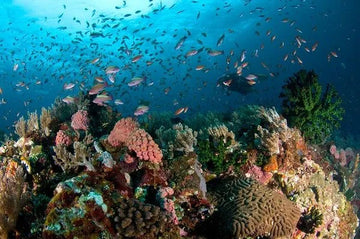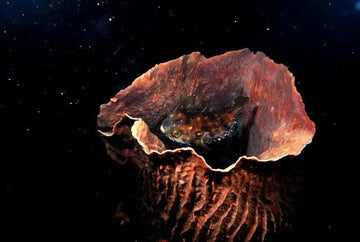Despite being one of the most feared animals (so much so that there is a phobia towards them, selacophobia), white sharks are very unknown to most of the population. What we know about white sharks is little and they are surrounded by more myths than realities. How long do white sharks live? Are they really so deadly for humans? How are they born? Do they live near the coast or in the high seas? Is it true that they do not develop cancer?
We debunk some myths and reveal curiosities about white sharks that you probably didn't know.
White shark facts
Great white sharks "give birth" to their pup
The white shark belongs to the 30% of ovoviviparous sharks, which means that the shark pup grows in an egg inside the mother which, after 12 to 18 months, hatches inside her. For a while it feeds on unfertilized eggs inside the mother.
Great white sharks usually create litters of four to seven pups, but they are not small at all. These tiny babies measure between 1.2 and 1.5 meters when they are born.
Shark Lovers T-Shirts
VIEW MORE SHARK T-SHIRTSIt takes 12 years to reach maturity
After that first decade, when they reach maturity, white sharks can reach up to 3 meters and 600 kilos. Females are always larger than males, about one meter longer both during these years and throughout their adult life.
They can reach up to 7 meters in length
The largest shark ever seen alive is Deep Blue, the majestic female you see in this video. It was first recorded in 2014 in Guadalupe, Mexico, for the Discovery Channel documentary "Jaws strikes back". And in 2021 she was not only seen, this time in Hawaii, but the freediver Ocean Ramsey had the great fortune to dive with her.
Deep Blue is estimated to be 6.1 meters long, weighing 2,000 kg and aged between 50 and 60 years. And she was apparently pregnant both times she has been sighted.
They live up to 70 years
Until the beginning of this century, it was believed that white sharks could live only 30 years. But different studies, mainly the one published by the scientific journal PLOS One, confirm that sharks can live up to 70 years.
In this 2014 study, four great white shark specimens, two males and two females, from the northwest Atlantic were analyzed. To determine their age, they analyzed the residual radioactive footprint of the vertebral cartilage that may have remained in their tissues after thermonuclear tests carried out in the area from 1950 to 1960.
These remains were indeed found in the tissues after carbon 14 analysis, estimating that the sharks were already alive and in the area in the 50's to 60's. Thus, they estimated that the largest male, of 5 meters, was an astonishing 73 years old of age.
They are cold-blooded but warm-bodied
Like most fish, white sharks are cold-blooded. But sharks of the Lamnidae family, such as the mako shark, for example, have the ability to increase their body temperature and keep it stable. This ability, known as endothermy, allows the white shark to transfer the heat generated by its muscles to the entire body, keeping its interior up to 13°C above the outside temperature.
Thanks to this ability, white sharks can venture into colder and deeper waters than other sharks. Endothermy also allows them to have that explosiveness that we see when white sharks shoot up from the bottom in search of marine mammals such as seals. In fact, to maintain this capacity in perfect functioning, they need many more calories than other sharks and that is why their favorite foods are seals or whale carcasses, rich in fat.

Daytime hunters
Although white sharks like low visibility conditions for hunting, they always hunt during the day. They prefer times like dawn and dusk because they rely on stealth to locate their prey. If a seal sees the great white coming, the shark doesn't stand much of a chance because the seal is much more agile and faster. To secure a meal, the great white shark has to surprise its prey, but its eyesight is not developed enough to hunt at night.
Detect electromagnetic fields
Like other sharks, white sharks have sensors, called ampullae of Lorenzini, with which they detect magnetic fields. They use these vials both to detect prey and to orient themselves in the ocean during their migrations.
They can detect a wounded animal from 5 kilometers away
This cliché about sharks is true and their sense of smell is really developed. It is believed that they would be able to detect a single drop of blood in 100 liters of water and it has been found that they can tell if there is wounded prey or a carcass 5 kilometers away.
Myths about great white sharks
They are coastal sharks
I'm sure more than once you've hit the beach looking for a shark fin sticking out of the surface. Feeling afraid to get into the water in case a white shark appears. This idea conveyed to us by Spielberg's "Jaws" is completely wrong. Great white sharks are not coastal creatures that wander among bathers looking for food.
The reality is that white sharks spend much of their lives in the open ocean, up to 1,000 meters deep. There are many research projects underway to study the behavior of white sharks, and it is only during this decade that we are finding out that white sharks spend most of their lives at great depths and far from shore. They only come close to the coast during spawning or chasing schools of fish. And it is also the smaller white sharks that feed on fish. Great white sharks prefer, as we have seen, fatter prey.
They attack humans
Since reliable data have been available, some 850 attacks and 100 deaths have been attributed to great white sharks. Half of them surfers in Australia. To give us an idea of the difficulty of being attacked by a white shark, the last death by attack of any shark species in Asia was in 2000, in Europe in 1989 and in Africa in 2015.
It is much easier to die in a bicycle accident, taking a selfie or attacked by a hippopotamus than by a shark. Great white sharks mainly attack surfboards or body boards by mistaking them for some of their more common mammalian prey, such as seals and sea lions. It is true that a 500 kg white shark with a small bite can easily cause fatal injuries, but it is more than difficult to meet a white shark on the coast.
Great white sharks cannot get cancer
This myth has done more damage to white sharks than cancer itself. Which they can indeed get. This false idea has led to a disproportionate overfishing of white sharks, especially by Chinese fishermen, who use their fins as a soup with anti-cancer powers. The reality is that sharks get cancer just like any other being.
There are many studies and photographs of sharks with large tumors, so it makes no sense to hunt sharks as a remedy against cancer, since they get it just like us. It is true that sharks have an amazing ability to heal from wounds and it is being studied if their DNA has some key to be able to heal us faster. But no, sharks are not immune to cancer.























